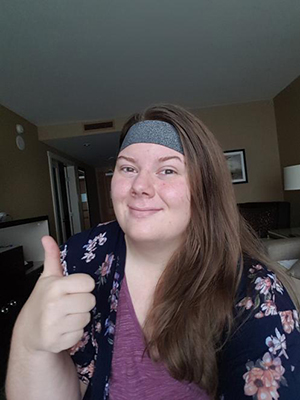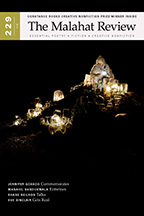Music & Memory: Julien Johnston-Brew interviews Kate Burnham

Fiction Editorial Board intern Julien Johnston-Brew talks with Kate Burnham, whose cnf piece "King of the Road" appears in our winter issue #229. They discuss writing your way out of emotional corners, sifting through scraps of memories, and how certain songs have a way of coming back to haunt us.
Read an excerpt from "King of the Road" here.
Kate Burnham's work has been featured in The Malahat Review, Miracle Monocle and on CBC Radio. She holds an MFA in Creative Nonfiction from the University of King's College. Her work has been nominated for the Canadian Digital Broadcasting Awards and she is the 2021 recipient of the H.R. Percy Prize for Creative Nonfiction.
Thank you for sharing “King of the Road” with us. I got the sense of this piece being a “coming to terms” of sorts with the heartache of losing loved ones; does your writing act as a means for you to digest lived experiences, or do you write in the aftermath of that coming-to-terms process?
I don’t know if we ever make it to the other side of the coming-to-terms process. I tend to write my way out of emotional corners. I spent a week at a writing retreat last year. It was summer, it was beautiful, I was miserable. I saw no one, I ate baked beans, I cried, I wrote this. I wouldn’t recommend it as a writing process, but it worked for me.
There seems to be an objective voice and emotional distance that you embody throughout “King of the Road.” Were these conscious choices, or did they emerge naturally as you wrote this piece?
I wanted to write down what happened, read it back, and figure out how I felt. Sometimes I want to wade through the mud and see if I can make the small details make sense. The more painful the experience, though, the safer it feels to float over it and maintain some distance.
I’m intrigued by the connections drawn between your father’s passing, “lonesome cowboy” music, and Z’s apparent fear of emotional intimacy; what is your process of pulling such elements together into a singular theme?
Themes are tricky. I wish we could see them while they’re still playing out. Assuming we could, would we make different choices? I don’t know. It’s only once time passes and you’re sifting through the scraps that you’re free to make connections and see patterns that at the time, felt like coincidences. Writing this, I realized certain songs were playing throughout. I wondered how I’d never noticed. Then I went back and added them up to see if I could make any meaning out of them. I couldn’t.
You create a wonderful mix of lived experience (in the form of relationships and travel) and media references (especially with music and movies); how do you find balance between personal storytelling and artistic inspirations?
I think we use music and movies to explain things––to make sense of, or to make light of, what we’re experiencing. They’re a shared shorthand. We quote movies to each other, we send songs back and forth, we lean on artists and directors who can better explain how something feels than we can.
Along a similar vein, there are many beautiful moments of poetry in your writing, my favourites being “I might have respected her more if she’d written it on the wind” and “gunslinging heroes who’d rather die in the dust than feel”; these lyrical twists seem inspired by music heard throughout your life. How does music influence your writing overall?
I find it easier to make playlists than to start writing. Once I realize how much time I’ve wasted, I’ll pick one song and play it on repeat. If I can find the song that played throughout an experience, I can slip back into the state I was in at the time. The more I listen, the more will come back into view; details and bits of dialogue and things I’d forgotten will float up to the surface. This was the first time I’ve thought about music and memory, how they inform each other, and how certain songs have a way of coming back to haunt us.

Julien Johnston-Brew









